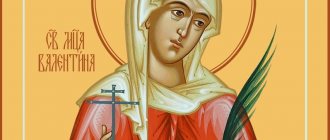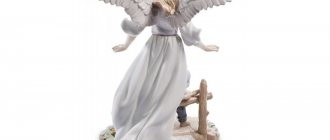With the revival of Orthodox traditions in our country, many questions arise related to terms and names. What are name days, how do they differ from namesake days and angel’s day? Who is the patron saint, and how to determine important days according to the Orthodox calendar? Let's consider all the questions in detail.
Name meaning for Christians
The tradition of naming children as soon as they are born has existed for more than one millennium. For our ancestors, first of all, this served as a distinctive sign among other members of society. The name also determined the social position and status of the bearer. Today this is clearly illustrated by the church names that clergy take when acquiring one or another rank.
Name day is a very important event for a believer
By naming a child, his parents seem to predetermine the future fate of the baby. If the name is chosen correctly, the path of life will be easy, and the person will live his life hand in hand with God's grace and luck.
Previously, children were called only by the name of the saint on whose day the child was born. Orthodox Christians attach a special sacred meaning to this tradition, because during baptism a connection is established between the soul and the Almighty. Having acquired the name of his heavenly namesake, the baby receives some of his personality traits, and also follows a similar path through life.
The Fall of the First People
Why do parishioners have such doubts? In one of David’s psalms there are the following lines: “Behold, I was conceived in iniquity, and my mother gave birth to me in sins” (Ps. 50:7). The Greek theologian Euthymius Zigaben argued that in this song David says that he was conceived in sin and was born in sin. According to Euthymius, humanity owes this state of affairs to Adam and Eve. “For if Adam had not sinned, then there would have been no need for him to have carnal intercourse with Eve,” writes the theologian. So is it necessary to celebrate such a sinful event as birth?
What is a namesake
Name day celebrations in Russia have begun to revive quite recently. Today this celebration is called the unusual word “name day”, or angel’s day. Such a tradition means a lot for Christians, because it brings a person closer to God and reminds him of the need to lead a righteous life.
The difference between name day and angel day
Although many believers equate these two concepts, there is still a difference between them. The main difference lies in the original meaning of the holidays. Thus, namesake days involve veneration of the saint after whom the person was named. They are celebrated, as a rule, on the day of remembrance of God's saint. But Angel Day is the calendar date when the child was baptized according to church customs.
In Orthodoxy, name days are considered a more significant event than a traditional birthday. A baby, named during the sacrament of baptism, finds a guardian angel and patron saint who will protect his ward until the end of his life, protect him from evil, and also intercede with the Almighty.
Differences between birthday and name day celebrations
Name day date
At the dawn of Christianity, the namesake coincided with the date of christening. There is nothing strange about this, since previously it was customary to perform the sacrament of baptism on the eighth day after birth and to name the child strictly according to the calendar. Much later, people began to move away from this tradition, naming children without reference to the church calendar.
Name day is considered to be the first date after a person’s birthday on which the saint after whom he was named is commemorated. If the naming is not associated with any saint of God, according to the church calendar they simply find a similar celestial being whose memorial day is closest to the actual date of birth.
If you look at the calendar, you will notice that most saints have several commemoration dates a year. These days are usually considered small name days and are celebrated along with the namesake.
Name day date for women
Baptismal name
Most often, during the celebration of the sacrament, the name given to the baby by the parents is written down in the church register. However, if you follow the Orthodox tradition, it is better to choose a suitable option from the calendar, naming the child in honor of the saint of God, who is commemorated on this date. As a rule, there is more choice for boys, and therefore girls are named either with a similar male name or in honor of a saint who is commemorated closer to the baby’s actual birthday.
It happens that the name given by the parents is not in the calendar. Then the child is called a consonant church analogue. Some believers specifically give children different names to protect them from the evil eye or damage. It is also allowed to baptize a child with a name if it is Christian, but not Orthodox.
Name day
This rite is performed during the baptism of a newborn, when he is named after the patron saint. Name day (name day) is the spiritual birth of a person; it does not apply to the physical world. The spiritual name of a person given at baptism remains with him for the rest of his life, as does the patronage of the saint.
Also, during baptism, a Guardian Angel appears to the newborn. Therefore, name day and Angel's day are one and the same.
However, there are special cases when name days do not coincide with Angel Day. Why? For example, a child was given a name at birth and kept it at baptism. Then the name day is celebrated on the day of remembrance of the saint with the given name, and the day of the Angel at another time.
Sometimes a name day can coincide with a physical birthday if the child has been given a secular name corresponding to the name of the patron saint of that day. If the baby is given a worldly name that is not in the Saints, at baptism he receives a new name.
Note! Before baptism, the baby is defenseless, so black sorcerers tried to cast terrible spells on the newborn during this period.
How to celebrate name days according to Orthodox custom? This tradition originated back in the 17th century. The whole family went to church, prayed to the patron saint and took communion. Upon returning home, they held a dinner where they were treated to pies, rolls, and kvass. The godfathers, the godparents of the birthday boy, were sure to be present at the evening.
After dinner, food was distributed to the guests - pies and rolls, so that no one left empty-handed. Many people are interested in the question: did they put candles on the birthday cake? No, there was no such tradition in Rus'. The custom of lighting candles on a cake came to us from abroad.
Name day celebration
A namesake is not just a holiday, but the veneration of a holy saint, one’s patron, for whose glory a person was named. That is why the celebration of this day has been taken very seriously since ancient times.
Old Russian traditions
What traditions our ancestors had can be seen from the history of already baptized Rus'. The first mentions of them date back to the 17th century. These were not merry celebrations, as believers saw deep spiritual meaning in the angel's day. People understood that by celebrating name days, they were honoring God's saint and their connection with the Almighty.
The name day began with a family trip to the temple to hold a church service about health in front of the image of the patron saint. At the end of the prayer service, all family members venerated the icon of the holy saint and lit candles. Then they went home, where they had a festive dinner. It was customary to invite not only close relatives, but also friends, and sometimes even neighbors. Guests were honored with festive dishes, ending the meal with a birthday cake.
It happened that the day of the angel fell on fasting. Then the celebration was postponed to the date following the end of the fast.
Name day for men
Post-revolutionary celebration
With the advent of communist power, the church was subjected to serious persecution, and Orthodox traditions began to be gradually forgotten. In the first decades of the twentieth century, there were even attempts to replace the namesake with initiation into October, Pioneers or Komsomol. However, true Christian believers, even in these difficult times, did not forget to celebrate name days - they gave each other cards or sent congratulations on Angel’s Day.
After the collapse of the Soviet Union, the church began to revive, and with it the centuries-old traditions. Today, the celebration of name days will no longer surprise anyone, since modern people continue to actively reach out to their origins.
What to give for name day
The best birthday gifts are considered to be items that help a person develop spirituality and strengthen faith. So, on the day of the angel it is customary to give:
- icons of the holy saint, after whom the birthday boy was named;
- Gospel or Bible;
- prayer candles;
- amulet
A good gift would be a trip to Orthodox shrines or a tour of holy places.
Author's advice
Icons of holy saints
Gospel or Bible
Incense
Let's summarize...
- Angel Day is the day of baptism (since it is on this day that Heaven allocates a protective angel to people).
- Name day is the day on which the church honors your “name” saint.
- Therefore, there is a difference between these Orthodox holidays: the day of the angel always falls on the day of baptism, and name days are quite rare these days. In addition, Angel Day occurs only once a year, and there can be several name days if the church honors the saint several times (example: “spring” and “winter” St. Nicholas the Wonderworker).
How to celebrate your angel and birthday in the Orthodox way?
The priest answers: When using materials from thebestvideo.ru, a link to the source is required.
Namesake of clergy
The name day for clergy is the date of acquisition of rank or church name. Ordinary church ministers conduct a solemn service in honor of their heavenly patron locally. But the highest ranks (metropolitans or patriarchs) perform the liturgy in the main church of the city.
It is also customary for clergy to give gifts for their namesake. All of them must have an ecclesiastical meaning. It could be:
- Orthodox literature;
- holy images;
- utensils for performing the sacraments;
- fabrics for vestments
Since ancient times, a person's name has been of great importance in his life. Given at birth, it leaves an imprint on the rest of your life. That is why you need to approach the choice consciously and give the child the right name.
If you find an error, please select a piece of text and press Ctrl+Enter.
Where did the tradition of celebrating birthdays come from?
Nowadays, few people congratulate you on the day of acquiring a church name or on the day of the winged guardian, and not everyone looks at the calendar of church dates. But you need to congratulate the hero of the occasion on his birthday. Where did the tradition of celebrating birthdays come from? During the Soviet years, the festive date of birth replaced church name days. But the celebration itself appeared much earlier. The first to mark the date of appearance in this world were the inhabitants of Ancient Egypt. But, of course, only pharaohs received such a high honor. The ancient Greeks introduced the concept of such a holiday only for the head of the family. For a long time, no one congratulated either women or children on their births. Children and representatives of the fair half of humanity began to be congratulated only after priests began keeping records of dates of births in the 12th century. A century later, children's birthdays were already solemnly celebrated in Germany - with a cake decorated with burning candles.
How to congratulate a loved one on the holiday? Of course, anyone, regardless of age, will be happy with the traditional cake and gifts. But the hero of the occasion will be even more pleased with the custom poems that can be ordered from us.
And, of course, give your good mood on any of these wonderful holidays.
Determining the date of name day and angel day
Today, more than two thousand Christian names of holy people who have been canonized are known. Name days in October, as in other months of the year, play an important role in a religious sense. Before choosing a name for the baby (for the baptismal ceremony), pay attention to the following point: many saints have different dates of honor, but the same names. To correctly determine the name day, select the closest date in the Orthodox calendar, which is celebrated as the day of remembrance of the saint. It should follow the baby's birthday. What is name day and angel day for a modern person if he knows nothing about these holidays? You can answer this question yourself if you have a great desire to pay tribute to your guardian angel.








